
Wasteland is a role-playing video game developed by Interplay Productions and published by Electronic Arts in 1988. The first installment of the Wasteland series, it is set in a futuristic, post-apocalyptic America destroyed by a nuclear holocaust generations before. Developers originally made the game for the Apple II and it was ported to the Commodore 64 and MS-DOS. It was re-released for Microsoft Windows, OS X, and Linux in 2013 via Steam and GOG.com, and in 2014 via Desura. A remastered version titled Wasteland Remastered was released on February 25, 2020, in honor of the original game's 30th anniversary.

Neverwinter Nights is a third-person role-playing video game developed by BioWare. Interplay Entertainment was originally set to publish the game, but financial difficulties led to it being taken over by Infogrames, who released the game under their Atari range of titles. It is the first installment in the Neverwinter Nights series and was released for Microsoft Windows on June 18, 2002. BioWare later released a Linux client in June 2003, requiring a purchased copy of the game to play. MacSoft released a Mac OS X port in August 2003.

Moto Racer, mislabeled as Moto Racer Gold, is an arcade style motorcycle racing game developed by Delphine Software International and published by Electronic Arts for Microsoft Windows and PlayStation. The game was originally to be published by BMG Interactive, but after BMG closed down its U.S. operations it sold the publication rights to Electronic Arts. Critics hailed the game as the first outstanding arcade-style racer to appear on PC, and the PlayStation version in turn was called a strong conversion in reviews.

Sacrifice is a real-time strategy video game published by Interplay Entertainment in 2000 for Microsoft Windows platform. Developed by Shiny Entertainment, the game features elements of action and other genres. Players control wizards who fight each other with spells and summoned creatures. The game was ported to Mac OS 9.2 in 2001.

Fallout: A Post Nuclear Role Playing Game is a 1997 role-playing video game developed and published by Interplay Productions. In a mid-22nd century post-apocalyptic and retro-futuristic world, decades after a global nuclear war between the United States and China, Fallout's protagonist, the Vault Dweller, inhabits the underground nuclear shelter Vault 13. After customizing their character, the player must scour the surrounding wasteland for a computer chip that can fix the Vault's failed water supply system. They interact with other survivors, some of whom give them missions, and engage in turn-based combat where they battle until their action points are depleted.
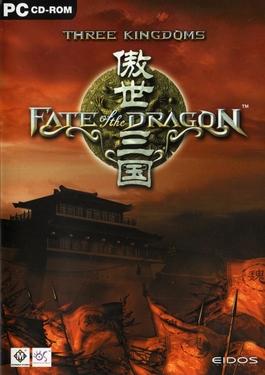
Three Kingdoms: Fate of the Dragon is a video game developed by Overmax Studios in 2001 for the PC. It is based on the historical background of the epic 14th century novel Romance of the Three Kingdoms by Luo Guanzhong. As one of the three Warlords of the Kingdoms, in 184 AD China, the player must build their own kingdom, develop new technologies and create mighty armies to conquer the other Warlords and ultimately take control of the Three Kingdoms and reunify China. Fate of the Dragon is a real-time strategy game very similar in format to that of the Age of Empires series, developed by Ensemble Studios, in which the user takes on the role of a character, namely Liu Bei, Sun Quan and Cao Cao from one of the Three Kingdoms and controls their kingdom through such means as pointing and clicking on certain parts of the map to decide what to do. The player is tasked with collecting various resources and building a standing army in order to protect their borders and defeat the other kingdoms in the game.

Star Trek: Starfleet Academy is a Star Trek PC simulation game developed and published by Interplay in 1997. The game simulates the life of a typical Starfleet cadet, with the player learning the basics of flying a starship and engaging in roleplaying with a crew of cadets, with the eventual goal of becoming captain of their own ship. The game included full motion video featuring William Shatner, Walter Koenig, and George Takei reprising their roles from the original television series and movies, and a multiplayer simulation mode allowing for up to 32 players.

Frankenstein: Through the Eyes of the Monster is a point-and-click adventure video game that stars Tim Curry as Dr. Frankenstein, and has the player controlling a newly created Frankenstein monster. Other cast members include Robert Rothrock as the voice of the monster, Rebecca Wink as villager Sara, and Amanda Fuller as Gabrielle, the monster's daughter. It used full motion video clips and 3D CGI graphics similar to Myst. The game was developed by Amazing Media and published by Interplay Entertainment Corp for the PC in 1995 and for the Sega Saturn in 1997. The game was given a "Teen" rating by the Entertainment Software Rating Board, but was originally rated as K-A. A port for the Atari Jaguar was in development but never released.

Descent to Undermountain is a role-playing video game developed and published by Interplay in 1998. Based on the Dungeons & Dragons setting of Undermountain in the Forgotten Realms, it casts the player as an adventurer out to explore the treasure-filled recesses of the Undermountain dungeon. The "Descent" part of the name refers to the game's use of the 3D rendering engine from the 1995 game Descent.
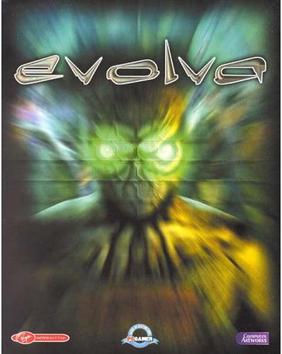
Evolva is a third-person action game created by British computer artist William Latham and game designer/programmer Mark Atkinson, and released in 2000.
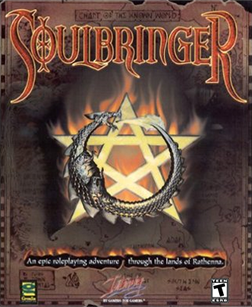
Soulbringer is a fantasy RPG developed by Gremlin Interactive and published by Interplay Entertainment and Infogrames in 2000. It was later packed and shipped in combination with Interplay's Planescape: Torment.
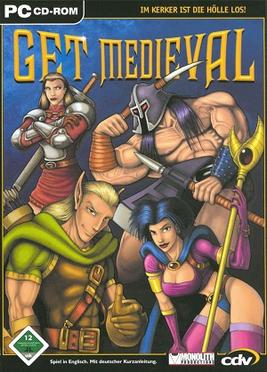
Get Medieval is a 1998 hack and slash dungeon crawl video game developed and published by Monolith Productions and Microïds for Microsoft Windows. The player controls one of four characters looking for the exit in a series of dungeons. The game is similar to that of the 1985 Atari Games arcade video game Gauntlet.
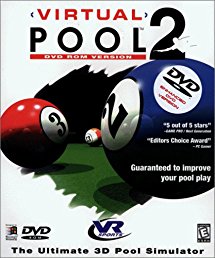
Virtual Pool 2 is a 3D, first-person sports simulation video game developed by Celeris and released by VR Sports on behalf of Interplay Productions in 1997. It is the third release of the Virtual Pool franchise of computer simulations of pool games developed by Celeris. VP2 is the second main series title in the Virtual Pool series, and would later be released alongside Virtual Pool 1.
Western role-playing video games are role-playing video games developed in the Western world, including The Americas and Europe. They originated on mainframe university computer systems in the 1970s, were later popularized by titles such as Ultima and Wizardry in the early- to mid-1980s, and continue to be produced for modern home computer and video game console systems. The genre's "Golden Age" occurred in the mid- to late-1980s, and its popularity suffered a downturn in the mid-1990s as developers struggled to keep up with changing fashion, hardware evolution and increasing development costs. A later series of isometric role-playing games, published by Interplay Productions and Blizzard Entertainment, was developed over a longer time period and set new standards of production quality.

M.A.X. 2: Mechanized Assault & Exploration, or simply M.A.X. 2, is a 1998 hybrid real-time/turn-based strategy video game developed and published by Interplay Productions. It's a sequel to Mechanized Assault & Exploration.
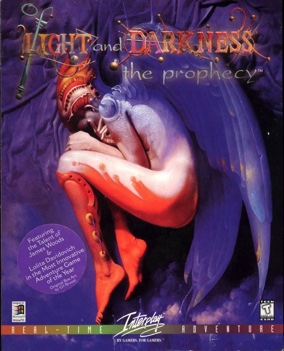
Of Light and Darkness: The Prophecy, also known as simply Of Light and Darkness, is a first-person point-and-click adventure video game developed by Tribal Dreams and published by Interplay Entertainment in 1998.

VR Baseball 2000 is a video game developed by American studio VR Sports and published by Interplay for Windows in 1998.

Baldur's Gate 3 is a 2023 role-playing video game developed and published by Belgian game developer Larian Studios. The game is the third main installment in the Baldur's Gate series, based on the tabletop fantasy role-playing system of Dungeons & Dragons. A partial version of the game was released in early access format for macOS and Windows in October 2020. It remained in early access until its full release for Windows in August 2023, with versions for PlayStation 5, macOS, and Xbox Series X/S releasing later that year.

















